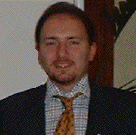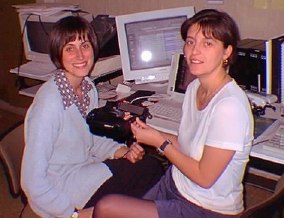
Riva is currently the Coordinator of the EC funded VEPSY Updated research project and coordinated the VREPAR - Virtual Reality Environments in Psycho-neuro-physiological Assessment and Rehabilitation - research projects.
As a part of the Istituto Auxologico Italiano, the ATN-P Lab has started its activity in 1994. The Istituto Auxologico Italiano is one of the main Italian research sites, with three main hospitals located in northern Italy. Clinical activity and research are carried out together, by many indipendent laboratories, each with its peculiar field of interest. This activity is still being carried out, in support of Istituto Auxologico's activities.
ATN-P Lab, headed by Giuseppe Riva, Ph.D. focussed on the
implicancies of psychological issues on Human-Computer Interaction, thus dealing with
technology related problems, as well as with more general psychological topics.
ATN-P Lab has conducted several researches on the possibility of using IT for clinical
treatment and assessment. In particular, the aim of most researches was to predict the
impact of short term therapy and to anticipate the follow up of long term therapy. The use
of neural networks technologies has been explored to achieve this goal. ATP Lab has
conducted several clinical researches in the field of Eating Disorders and Eating
Behaviour.
In July 1995 ATN-P Lab has been funded by the EC for the study of medical issues in
Virtual Reality, and more specifically for the development of a VR module for the
rehabilitation of patients suffering from eating disorders (such as bulimia or binge
eating), post-stroke disorders and Parkinson's disease. ATN-P Lab is currently involved in
a number of international research projects. Its interest now focuses on psychological
issues dealing with communication, technology and virtual realities.
ATN-P Lab also co-ordinates the activities of the IT VRSIG (Virtual Reality Special
Interest Group). The IT VR-SIG, in coordination with the other VR-SIGs around the world,
provides information and provides a wide range of activities related to Virtual Reality
and its implementation in many sectors of industry and commerce.
 |
Giuseppe Riva, Ph.D., is Professor of General Psychology
at the Catholic University of Milan, Italy, and Senior
Researcher at the Applied Technology for Neuro-Psychology Laboratory - ATN-P Lab.,
Istituto Auxologico Italiano, Milan, Italy. Riva is currently the Coordinator of the EC funded VEPSY Updated research project and coordinated the VREPAR - Virtual Reality Environments in Psycho-neuro-physiological Assessment and Rehabilitation - research projects. |
He received his Ph.D in Social and Developmental Psychology from the Catholic University of Milan, Italy. In the ATN-P Lab. he conducted several researches and published many papers about methods and assessment tools in psychology and about the use of Virtual Reality in medicine and in training.
Member of the New York Academy of Science and the American Psychological Association, Riva is actually Associate Editor for the "CyberPsychology & Behavior" journal and Content Editor of the "International Journal of Virtual Reality".
He has also played a key role in several researches carried out by the GRICO, Gruppo di Ricerca sull'Interazione COmunicativa (Research Group on Communicative Interaction) of the Catholic University of Milan, many of which focused on issues concerning methodological and psychological implicancies in the use of new information technologies.
Click
here for the latest papers and books published by Riva (full papers in PDF
format).
Margherita Baruffi, M.S., is Associate Researcher at the Applied Technology for
Neuro-Psychology Laboratory, Istituto Auxologico Italiano, Verbania, Italy. She received
her M.S. in Psychology from University of Padua, Italy. Her interests include clinical
applications of virtual reality, disabled rehabilitation and cognitive-behavioral therapy.
Monica Bacchetta, M.S., is Associate Researcher at the Applied Technology for Neuro-Psychology Laboratory, Istituto Auxologico Italiano, Verbania, Italy. She received her M.S. in Psychology from University of Turin, Italy. Her interests include clinical applications of virtual reality, training-on-the-job and cognitive-behavioral therapy.

Monica and Margherita in the Lab
The Istituto Auxologico Italiano is a scientific
institute which was born as Foundation in 1963. Its biomedical research is carried out
mainly by means of the diagnosis and treatment of diseases which undermine harmonious
psycho physical development, in relation to which it follows the course of various
diseases over time and intervenes in terms of prevention, treatment and rehabilitation.
In 1972, it was recognized by the Ministry of Health and by the Ministry for Universities
and Scientific and Technological Research as an "Istituto di Ricovero e Cura a
Carattere Scientifico - I.R.C.C.S." (an institutes that carries out research and care
activities in the biomedical field).
The Istituto Auxologico Italiano is now a private non-profit making organization,
institutionally considered as falling somewhere between a private and public service. It
has thus managed to combine the public service characteristics with the efficiency that is
typical of private bodies, allowing a reduction in costs and appreciable results at the
level of treatment.
The Istituto Auxologico Italiano has three operating health care centers:
The above mentioned centers cover an area of 185,000 m2 and have a total of 500 beds
Its diagnostic and clinical activities, which are carried out in a modern in and
outpatient departments and supported by the continuous research activities of many
experimental laboratories (Scientific Director: Prof. A. Zanchetti), have allowed the
Istituto Auxologico Italiano to establish a consolidated presence in the field of
nutrition (Laboratorio Sperimentale di Ricerche Nutrizionali, headed by Prof. F. Balzola),
applied psychology (Laboratorio Sperimentale di Ricerche Psicologiche, headed by Prof. E.
Scabini) and endocrinology (Laboratorio Sperimentale di Ricerche
Endocrinologico-Metaboliche, headed by Prof. F. Cavagnini).
In particular, the common work of the different laboratories leaded to an integrated
approach focused on nutritional rehabilitation. The key issues of such approach are:
For any questions or requests, please contact auxo.psylab@auxologico.it